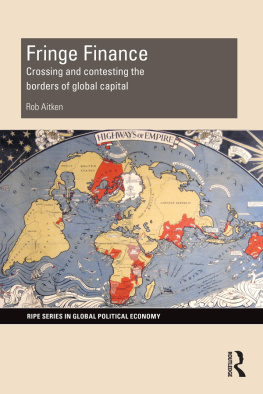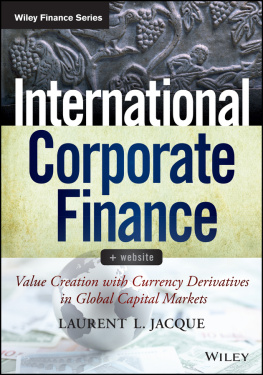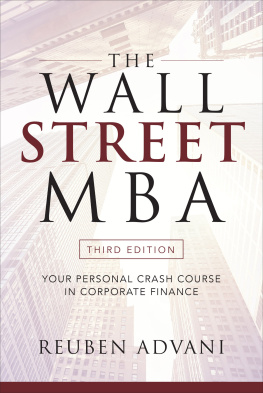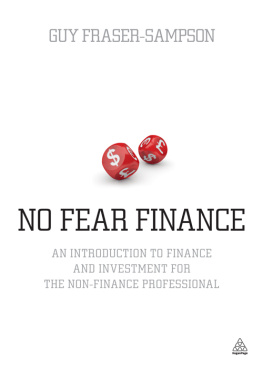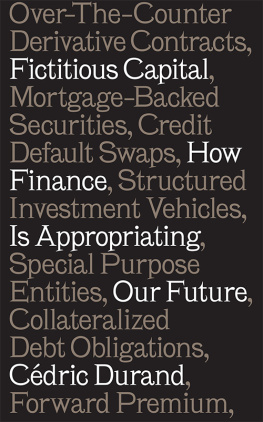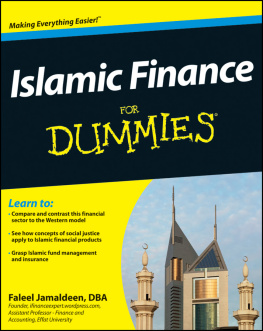
The filmic representation of finance is intimately connected to how we understand, analyse and resist financial markets. This wonderful anthology presents a cultural analysis of finance film and documentary from its earliest days to the present, showing our enduring fascination and repulsion of speculation. It offers a detailed reading of the narrative and visual themes of financial representation, and a novel perspective on its politics.
Marieke de Goede, University of Amsterdam, author of Virtue, Fortune and Faith.
This book, the first of its kind, provides a cogent, multifaceted account of the collision of two great dream machines that define our era: film and finance. The first has become our global societys most powerful form of storytelling; none of us can deny the seconds extensive and intensive power over almost everything in this interconnected world. In addition to the rigour and diversity of the approaches taken by its authors, what I find especially admirable about this collection is that, by bring film and finance into critical proximity, we come to learn much more about the power and the limits of each. As we struggle today to grasp the nature of global finance before it further destabilizes our precarious world, this book will help us hone our critical imaginations. For this reason, I highly recommend it not only to scholars but to film-makers, artists and activists seeking new ways to represent the terrible power of money, and offer the alternative visions we so dearly need.
Dr Max Haiven, Lakeland University, Canada.
The essays in this pioneering and timely book make a major contribution to our understanding of finance on film. The collection discusses how films of all kinds have registered the growing dominance of the financial sector over our political cultures and everyday lives in the years leading up to and after the near-global financial crisis of 2007-2008. Acutely aware of how cinema helps to shape and inform popular opinion and understanding, the writers here argue that recent finance films offer us a crucial sphere for reflection on the economic state that were in and show us routes to forms of critical intervention in the name of economic and social justice. This collection makes essential reading for anyone concerned with understanding how we have come to explain the contemporary financial sector to ourselves. Global Finance on Screen will be indispensable to anyone wanting to make sense of contemporary capitalism and of the stories we tell about it.
Dr Alasdair King, Queen Mary University of London, UK.
Global Finance on Screen aligns itself with the struggle for an effective critique of financial capitalism across the social sciences and the humanities. The concern-driven approach of this volume assembles research on finance film at a moment in contemporary financial capitalism when filmmakers assume a deliberately critical view on finance. The volume reconstructs and re-interprets these critical social analyses from a wide range of filmic genres and formats, including documentaries, feature and television films and spanning a period of 100 years of filmmaking. The contributions touch upon finance-related issues represented in film that address much broader audiences in cultural economy and the social study of finance, such as the temporalities of finance, orders of economic and financial knowledge, or social-structural polarizations conditioned by finance. The volume is thus powerfully placed as a contribution to economic history from a Cultural Studies perspective, but it articulates also highly nuanced contemporary diagnoses of financialized societies.
Professor Andreas Langenohl, Justus Liebig University, Germany.
Global Finance on Screen
Global Finance on Screen is the first collection exclusively dedicated to the growing body of multi-format and multimedia audiovisual work that this book designates as the finance film. Finance film presents both the lives and deeds of bankers and the effects financial transactions, money, credit, greed, and economic recessions have on communities in general, on men and womens well-being, desires, values, and actions.
The chapters for this book are written by European and North American scholars in film studies, anthropology, business ethics, cultural studies, political economy, and sociology. Their contributions reveal the potential of film to document financial cultures, spread finance and capitalist mythology; trace economic, cultural and political transformations; inform, raise awareness, express public outrage, and provide insightful criticism of the alienating and exploitative consequences of the growing role played by financial services in the economies of the Western world. The collection offers in-depth interdisciplinary investigations of feature films such as Wall Street, Freefall, Margin Call, Justice&Co, The Wolf of Wall Street, and The Big Short, and documentaries such as Inside Job, Capitalism a Love Story and In a Strange Land.
Constantin Parvulescu is research fellow at the Institute for Culture and Society, University of Navarra, Spain and guest lecturer at the University of St Gallen, Switzerland. He has published articles on the audiovisual representation of financial services and the intellectual interventions of European cinema. He is author of Orphans of the East: Postwar Eastern European Cinema and the Revolutionary Subject (Indiana University Press, 2015) and the co-editor of A Companion to the Historical Film (Wiley-Blackwell, 2013).
Global Finance on Screen
From Wall Street to Side Street
Edited by Constantin Parvulescu
First published 2018
by Routledge
2 Park Square, Milton Park, Abingdon, Oxon OX14 4RN
and by Routledge
711 Third Avenue, New York, NY 10017
Routledge is an imprint of the Taylor & Francis Group, an informa business
2018 selection and editorial matter, Constantin Parvulescu; individual chapters, the contributors
The right of Constantin Parvulescu to be identified as the author of the editorial material, and of the authors for their individual chapters, has been asserted in accordance with sections 77 and 78 of the Copyright, Designs and Patents Act 1988.
All rights reserved. No part of this book may be reprinted or reproduced or utilised in any form or by any electronic, mechanical, or other means, now known or hereafter invented, including photocopying and recording, or in any information storage or retrieval system, without permission in writing from the publishers.
Trademark notice: Product or corporate names may be trademarks or registered trademarks, and are used only for identification and explanation without intent to infringe.
British Library Cataloguing-in-Publication Data
A catalogue record for this book is available from the British Library
Library of Congress Cataloging-in-Publication Data
A catalog record for this book has been requested
ISBN: 978-1-138-04527-9
ISBN: 978-1-138-04528-6
ISBN: 978-1-315-17203-3
Typeset in Bembo
by Out of House Publishing
Contents
Constantin Parvulescu
Graham Murdock


